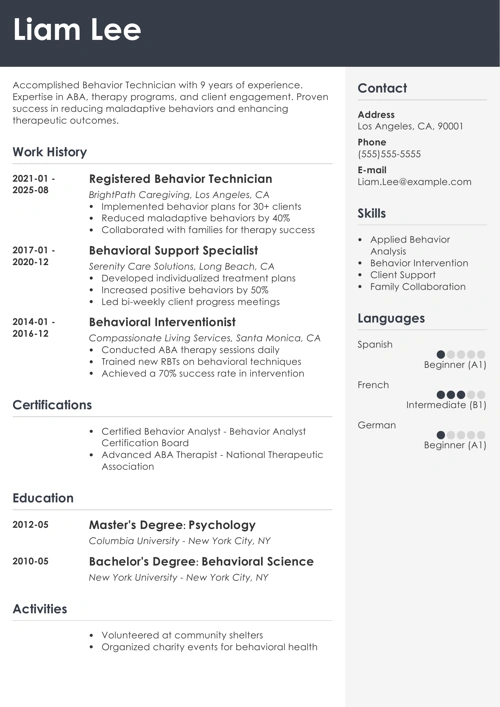
In April, the US unemployment rate hit levels highest since the Great Depression—14.8%. May has seen a slight improvement (13.3%), but many positions are not looking likely to reopen.
For some of us the pandemic has already brought grim new reality. And while the idea of social distancing sounds at times appealing, the menacing economic crisis, possibly the worst we’ll ever experience, is something no one is looking forward to.
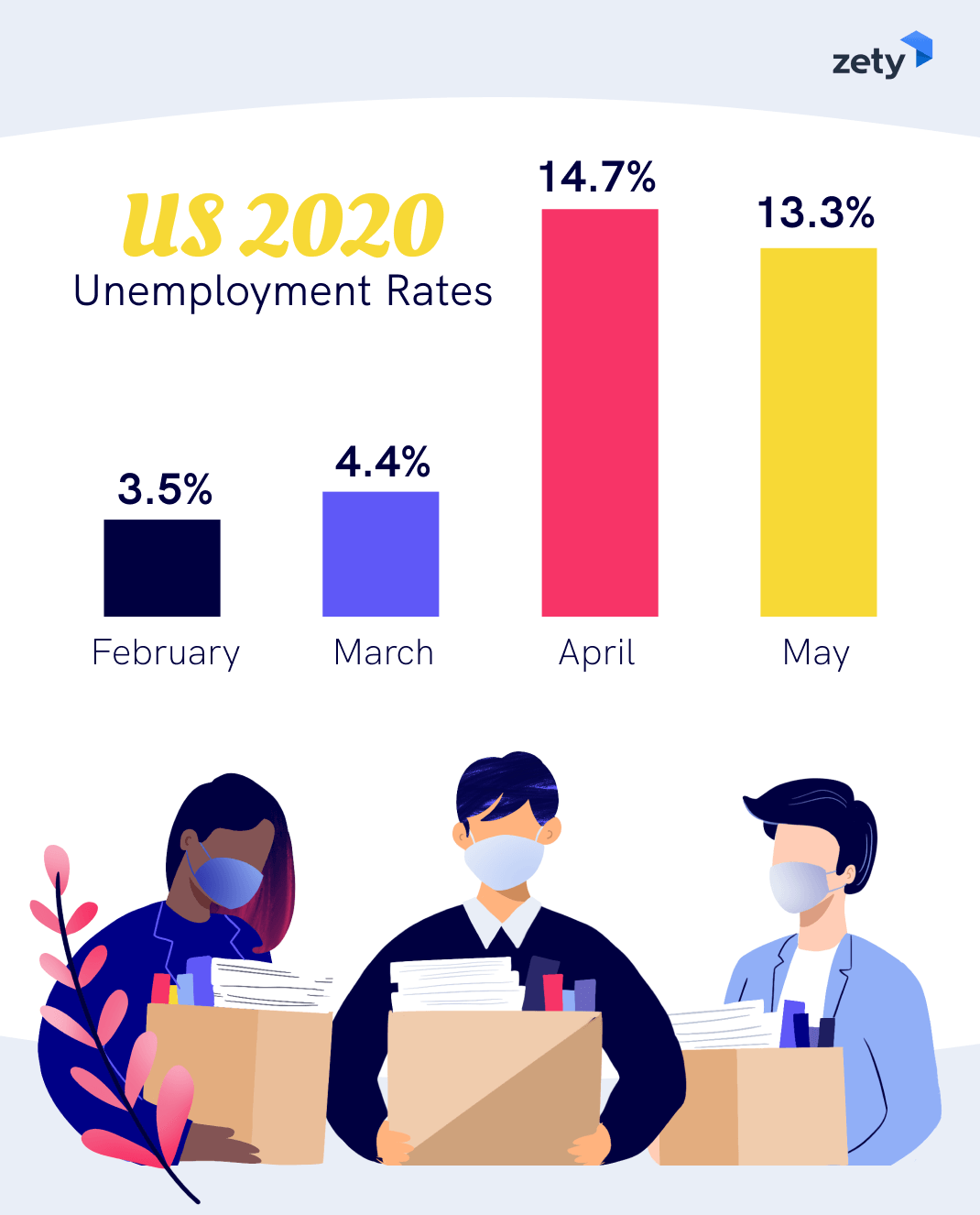
According to the BLS data from February through May 2020, those jobs were hit the hardest by the COVID-19 pandemic:
- Retail clerks (mainly in clothing and furniture stores): 53% of jobs lost
- Dental office staff: 53% of jobs lost
- Film and TV production specialists: 48.5% of jobs lost
- Food servers and waiters: 48% of jobs lost
- Performing artists: 45% of jobs lost
- Cooks and chefs: 44% of jobs lost
- Hospitality and overall front-desk staff: 42% of jobs lost
- Air transportation workers: 39% of jobs lost
- Real estate and property management specialists: 38% of jobs lost
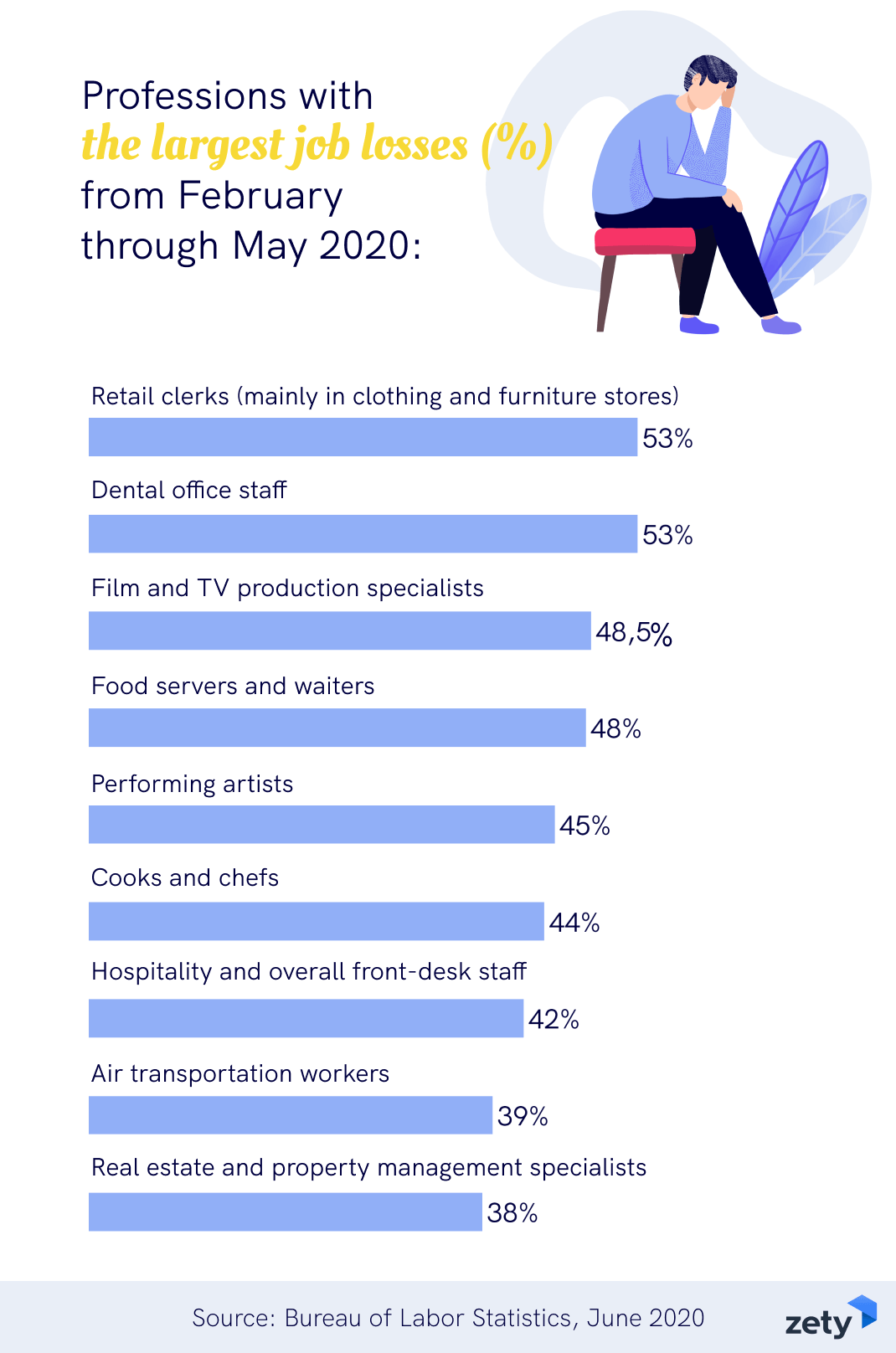
The bad news for job-seekers working in the above-listed sectors? The current economy just isn’t on your side.
We analyzed Indeed’s latest data on new job postings. The key finding? Most of the industries experiencing the biggest loss of jobs due to the pandemic are in a steady decline, namely:
- Arts and Entertainment,
- Hospitality and Tourism,
- Dental,
- Food Preparation and Service.
If you’ve held (and lost) one of the above-mentioned jobs and feel disheartened, don’t lose hope just yet though—
You’re more than your most recent job title.
As a working professional, you’ve had unique experiences that helped you develop a set of valuable skills—skills that many employers will find useful.
The industry you’ve been employed in might be doomed for months to come. But it’s never too late to change a career (or even make a temporary switch). Of course, right now it’s mostly about finding a stable source of income. But in the long run, it might help you become more versatile on the job market and more valuable to employers.
What is the right “new” career for you though? After all, you can’t just switch from acting to electrical engineering. Why not take it from those who successfully changed careers in the past? And no, I don’t mean some anecdotal examples. I mean hard data.
Together with our data science team, we analyzed over 130 thousand real-life resumes created in our builder between 2017 and 2019. We wanted to find out what alternative career paths were most popular amongst people who held jobs in industries that are now struggling.
In other words: we’ll show you what others in your situation were able to do (plus, provide some bonus tips on how to replicate their success).
Let’s get started.
The Two Most Popular Alternative Careers for *Any* Profession
The first thing we noticed when going through the data extracted from our resume builder was that for every occupational group we analyzed, two professions stood out as the most common career alternatives:
- Administrative assistant
- Customer service specialist.
In other words, no matter if you’re a performing artist, a line cook, a flight attendant, or anyone else who’s just lost a job due to COVID-19, you’re likely to find new employment in an administrative or customer service role.
Why’s that the case?
First of all, as BLS data shows, these two occupations are by far the most popular in the US. Even amidst a flagging economy, there will always be some jobs available in these two sectors.
Secondly, administrative and customer service jobs are extremely career-transition-friendly—a lot of skills required to be successful in one of those roles are transferable, “soft” skills.
We’ve extracted the most commonly listed skills candidates in administrative assistant positions put on their resumes. Here’s the top 10. Soft skills are highlighted in yellow:
- Communication
- Salesforce
- Time Management
- Microsoft Office
- Customer Service
- Problem Solving
- Organization
- Microsoft Excel
- Teamwork
- Leadership
See that? That’s 7 out of 10! And those aren’t strictly job-related qualifications—you might have (and probably have) developed at least some of those skills in your professional life. Becoming an administrative assistant will obviously require a lot of on-the-job training but as a temporary side career, it’s probably within your reach!
Then, we did the same for customer service representatives. Have a look:
- Customer Service
- Communication
- Time Management
- Problem Solving
- Teamwork
- Leadership
- Adaptability
- Microsoft Office
- Multitasking
- Organization
9 out of 10 of the most common CS skills are transferable! It’s an even more extreme example of a career based on social and people skills. Now, I’m not saying those are qualities every job seeker possesses but, again, if you think you do have them, becoming a customer service specialist is a career move seriously worth considering.
Not a “people’s person” at all? Don’t worry. The game-changing advice is yet to come.
Below, you’ll find lists of the most common alternative career paths for all professions most painfully struggling with the COVID-19 crisis.
Need easier navigation? Use this interactive table of contents with jump-to links:
Table of Contents
Most common alternative careers for:
- Retail workers
- Dental office employees
- Film and TV production
- Food service
- Actors and performance artists
- Food preparation
- Hospitality workers and front-desk staff
- Flight attendants
- Real estate and property management
Retail workers
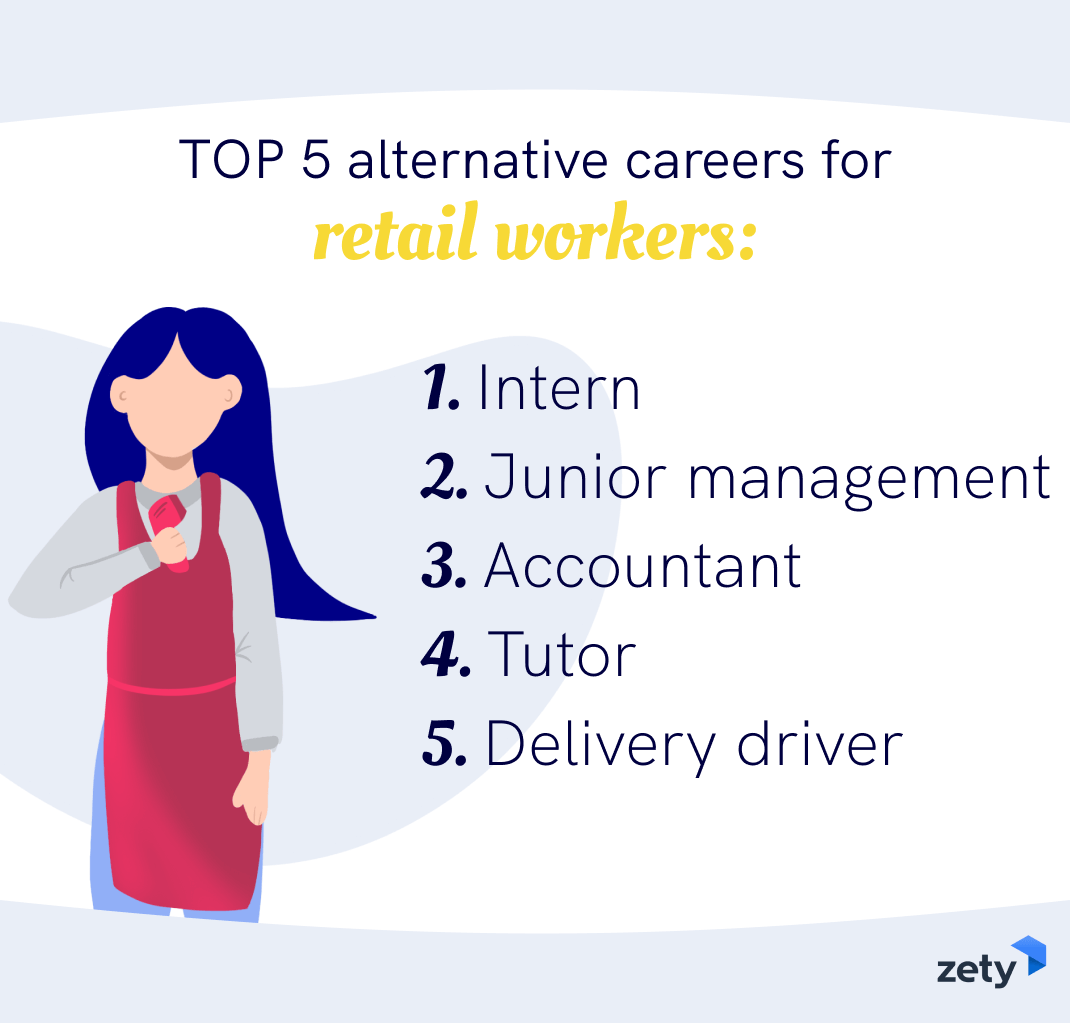
Top 5 alternative career paths
- Intern
- Junior management
- Accountant
- Tutor
- Delivery driver
As you can see, the options are very diversified.
Most retail employees who successfully changed careers, started out as interns in other industries.
Most likely, the data depicts a natural career progression of young people working in retail to support themselves during studies and then entering the job market as interns or junior employees.
Former retail workers are also likely to find employment in junior management positions (most likely they remain in the same field, but are promoted to a supervisory role) or as accountants—and both careers make perfect sense. The thing is, teamwork and leadership skills gained while working on a retail team can easily be transferred to a junior managerial position in another industry. Similarly, operating cash registers, stocktaking, and basic budgeting learned while working in retail can prove invaluable in an accounting job.
Dental office employees
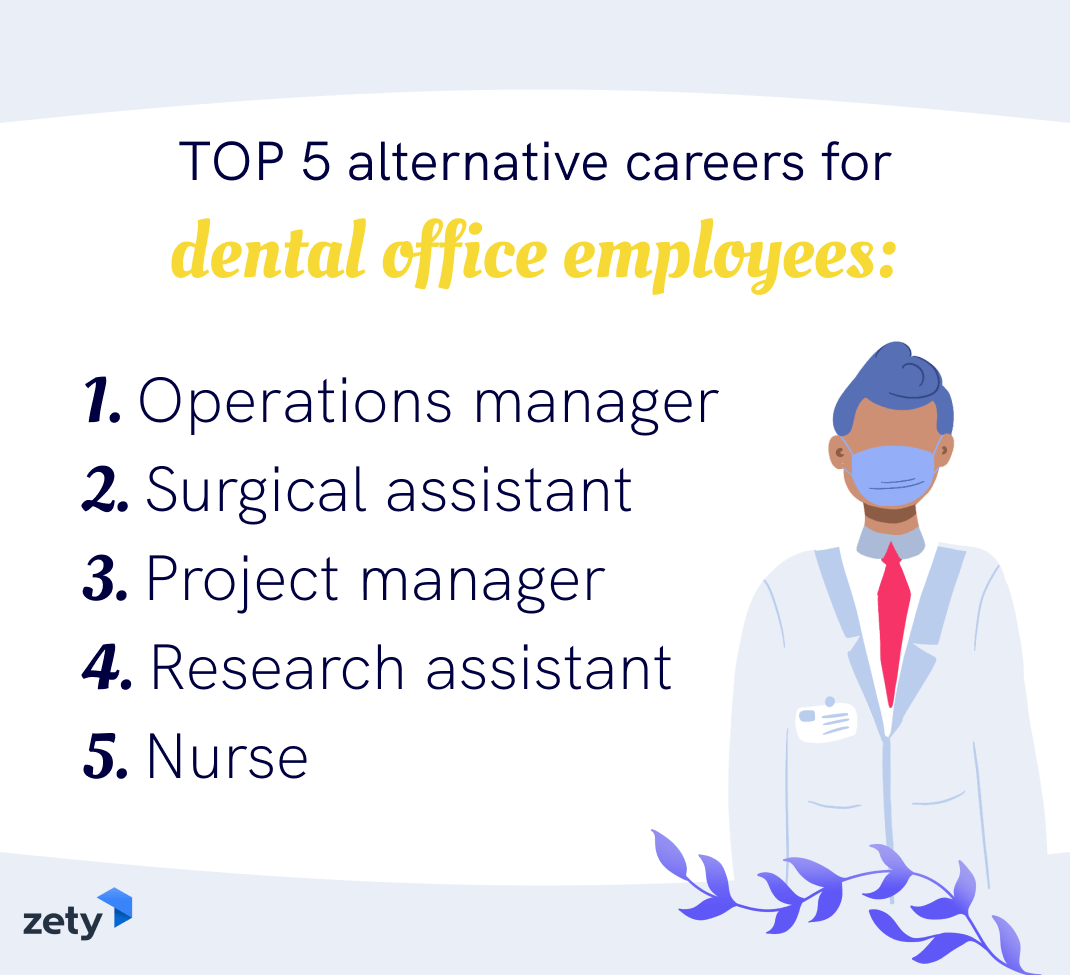
Top 5 alternative careers
- Operations manager
- Surgical assistant
- Project manager
- Research assistant
- Nurse
The jobs above can be divided into two categories: medical jobs in other fields (surgical assistant, research assistant, nurse), and process management occupations (operations manager and project manager).
The fact that many dental office employees can find jobs in other medical fields is rather intuitive. But, as you can see, working in a fast-paced, technically complex environment can help you transition into a job where managing processes or operations is the name of the game. Sure, many ex-dental-office-clerks working in operations management stayed in the medical industry—but that doesn’t mean they wouldn’t be able to apply their skills in a process managing role in another field.
Film and TV production
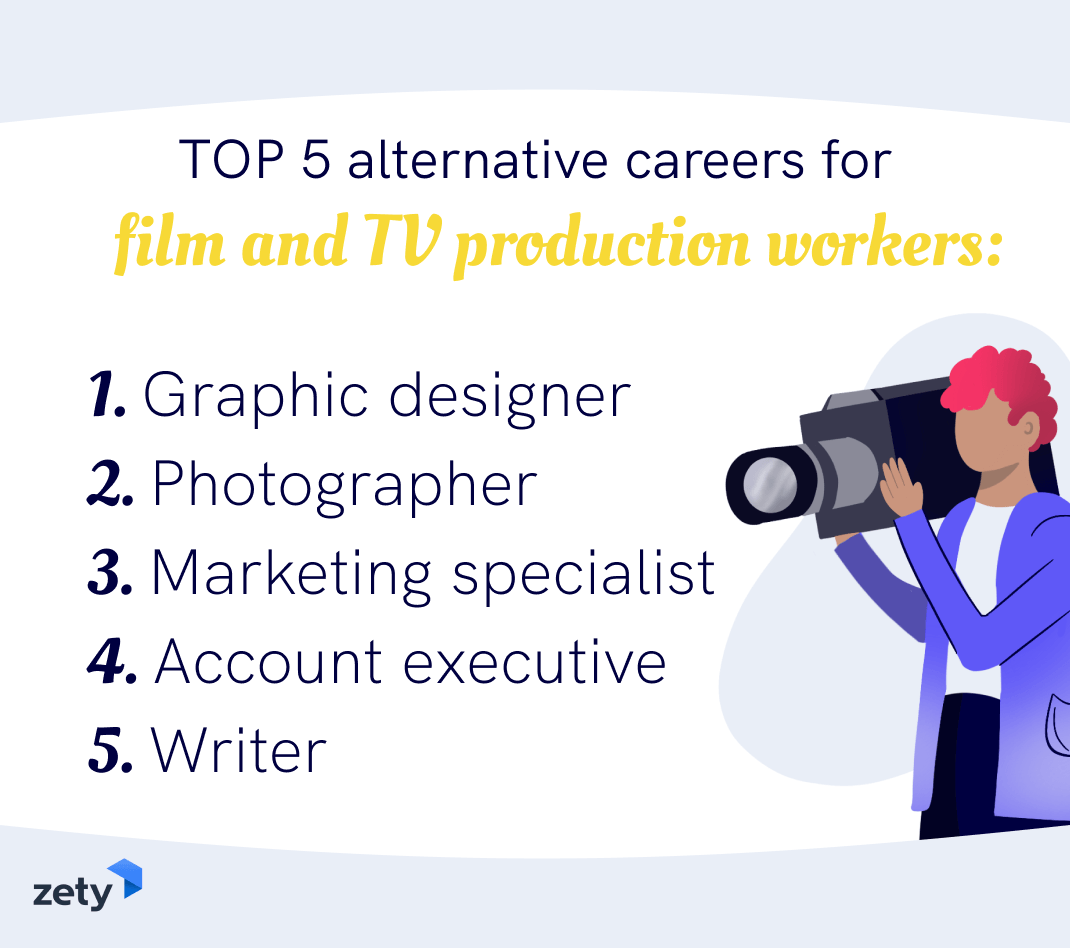
Top 5 alternative career paths
- Graphic designer
- Photographer
- Marketing specialist
- Account executive
- Writer
When working in video production, you’re supposed to be proficient in (or at least familiar with) so many things—cinematography, event management, marketing, stage management, and so on. No wonder ex film and TV production employees were able to transition into various creative roles.
If you just lost your job as a video production worker, make use of your proficiency in visual materials and consider a career in graphic design or photography. Alternatively, rely on your sales-oriented skills and apply for agency jobs in marketing.
Not to mention the plethora of reports, press releases, or bulletins you had to write over the years—writing jobs, be that in content marketing, journalism, PR, or consulting could very well be your next career move.
Food service
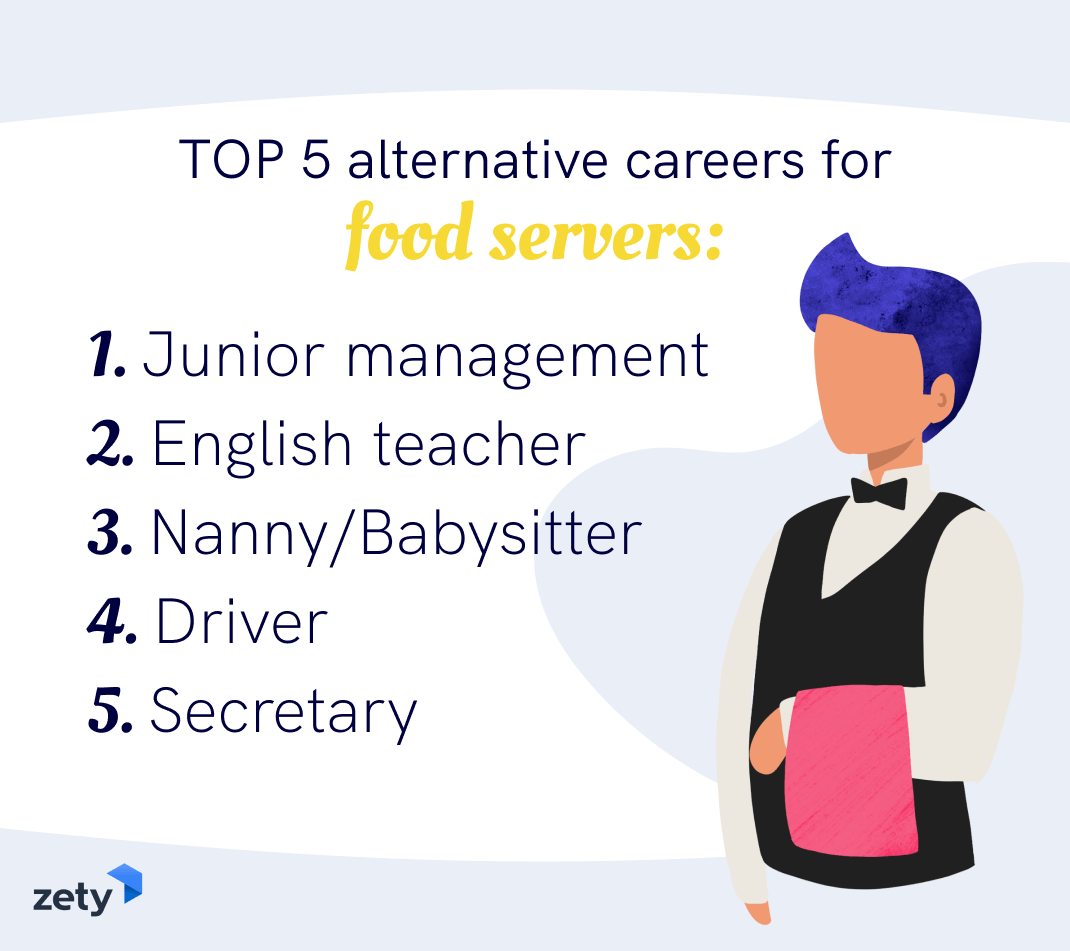
Top 5 alternative career paths
- Junior management
- English teacher
- Nanny/Babysitter
- Driver
- Secretary
The most common alternative career path for food servers is junior management (similarly to retail workers, food servers most likely get promoted to managerial roles in their field)! It doesn’t mean, though, that you can’t apply for junior managerial roles in other industries. Lost your job waiting tables? Consider taking advantage of everything you’ve learned on the way about working in a team and assisting new hires—the skills you’ve developed can easily help you thrive in an entry-level assistant manager position.
You can also take up a temporary job as an English-as-second-language teacher (can easily be done 100% online), or a babysitter. Or (as long as you have a driver’s license), work as a taxi or a delivery driver for a while.
Actors and performance artists
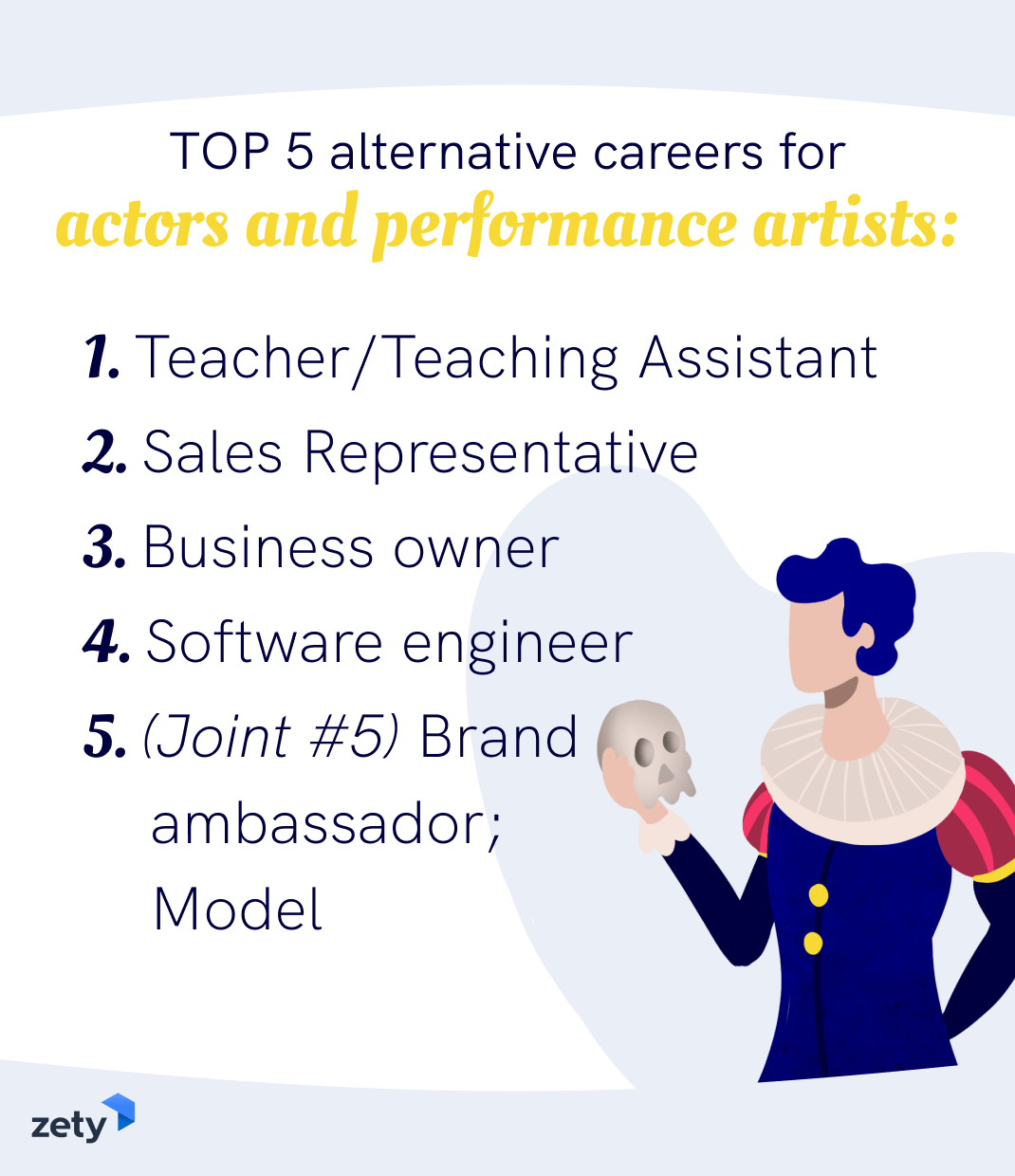
Top 5 alternative career paths
- Teacher/Teaching Assistant
- Sales Representative
- Business owner
- Software engineer
- (Joint #5) Brand ambassador; Model
One of your greatest professional assets as a performing artist is confidence. This can easily help you transition into a sales rep, a brand ambassador, or (if you have the looks) a model.
Another popular alternative career for performing artist is teaching—while taking a break from your active acting career, you can share your knowledge in an acting school.
Food preparation
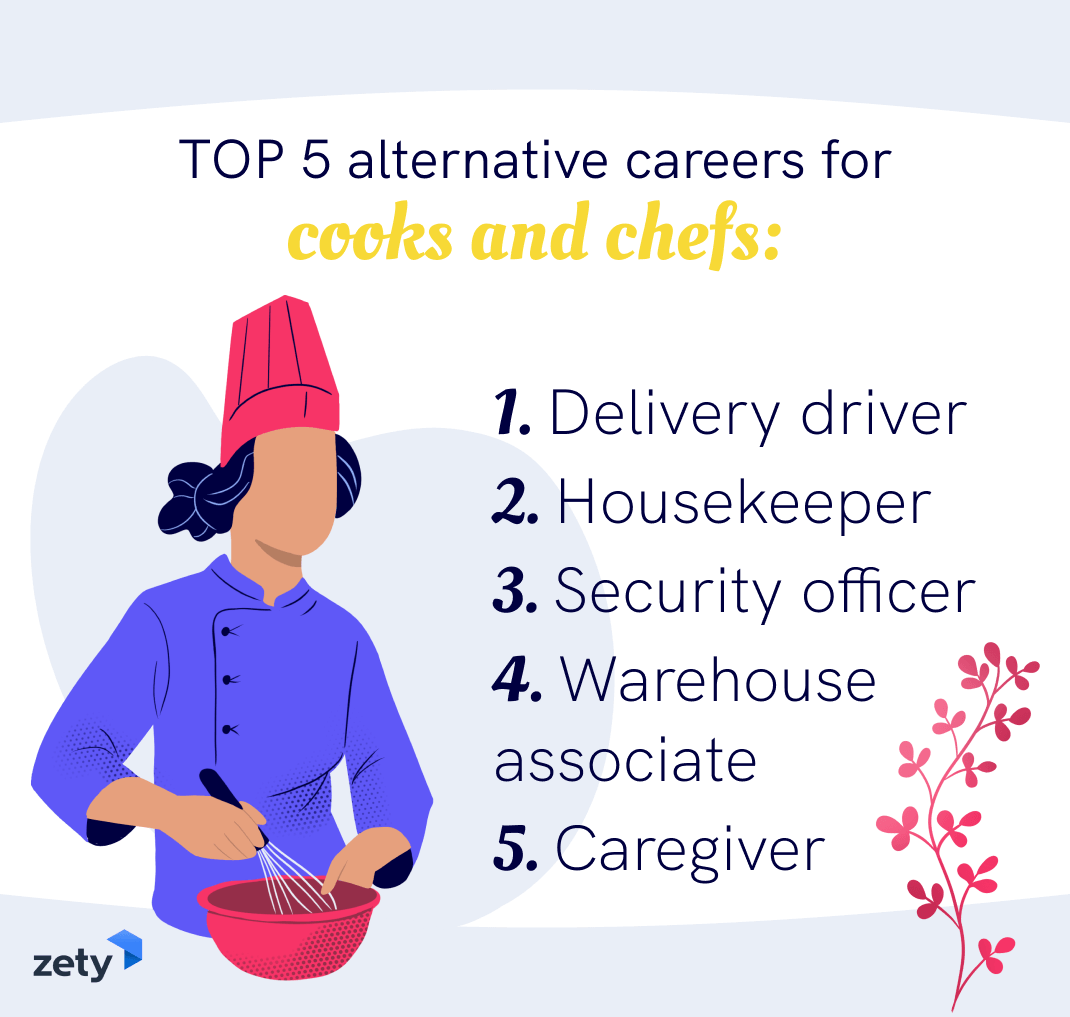
Top 5 alternative career paths
- Delivery driver
- Housekeeper
- Security officer
- Warehouse associate
- Caregiver
All of the most common side career options for food preparation workers are in general labor. Yes, those positions have little to do with what you’ve been doing in the past. The problem is, your skills are so industry-specific, it’s hard to translate them into another field.
The good news is, general labor jobs haven’t declined (we’ll get into that in-depth), so you’ll likely have a wide selection of job opportunities to choose from.
Hospitality workers and front-desk staff
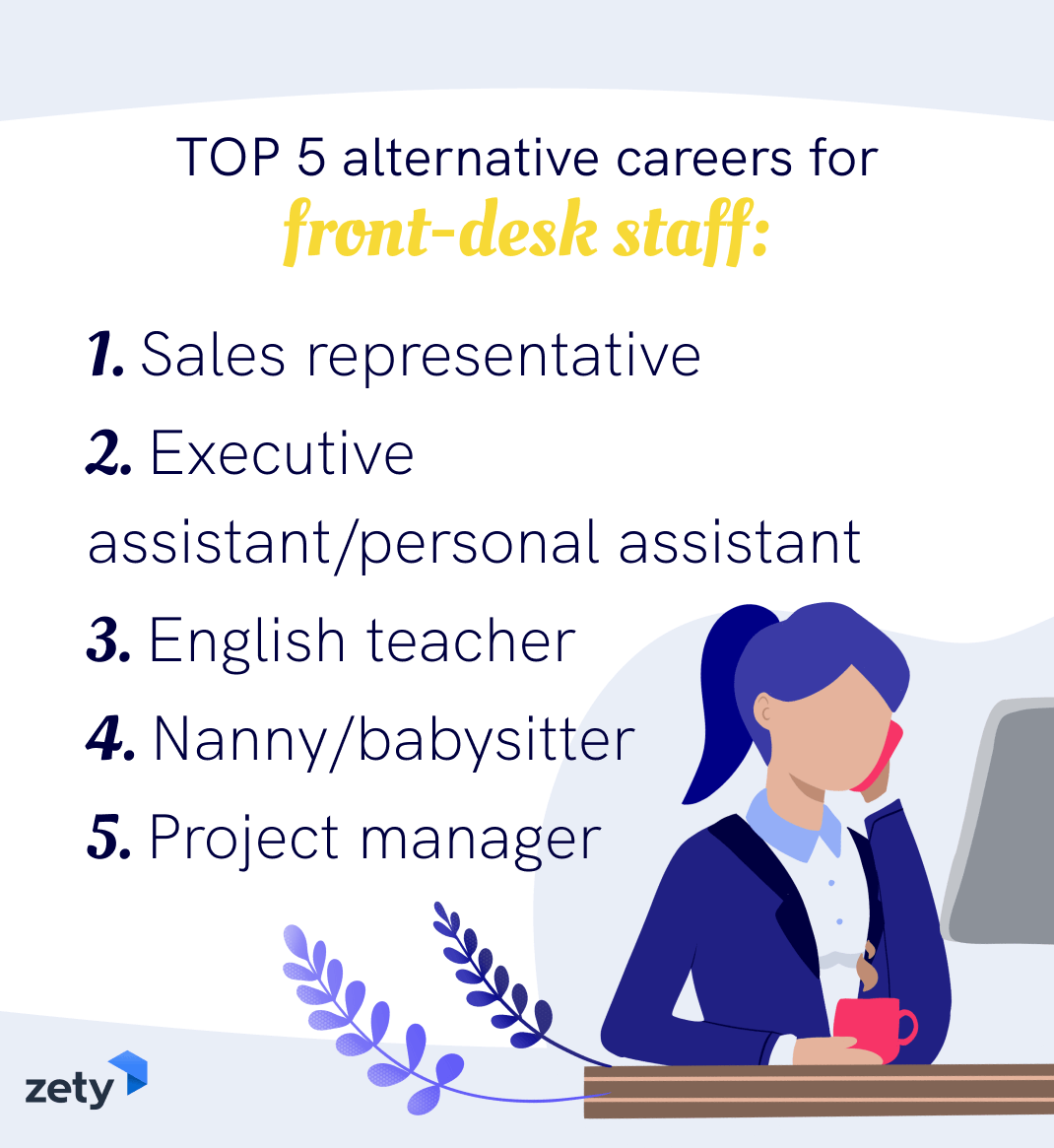
Top 5 alternative career paths:
- Sales representative
- Executive assistant/personal assistant
- English teacher
- Nanny/babysitter
- Project manager
Those of you who lost their jobs in hospitality or as front-desk receptionists have a wide range of “new” careers to choose from. You can stick with the corporate culture and make use of your friendliness and demeanor to become a successful sales representative—a career largely based on building and maintaining relationships. Another option is a personal or executive assistant: skills such as scheduling, making appointments, and dealing with administrative tasks will definitely make you a good candidate for such roles.
Alternatively, many former hospitality employees managed to make a career switch to less rigidly 9-to-5 jobs such as babysitting or teaching ESL. If you’re looking for more flexibility, those two careers are worth looking into, even if on a temporary basis.
Flight attendants
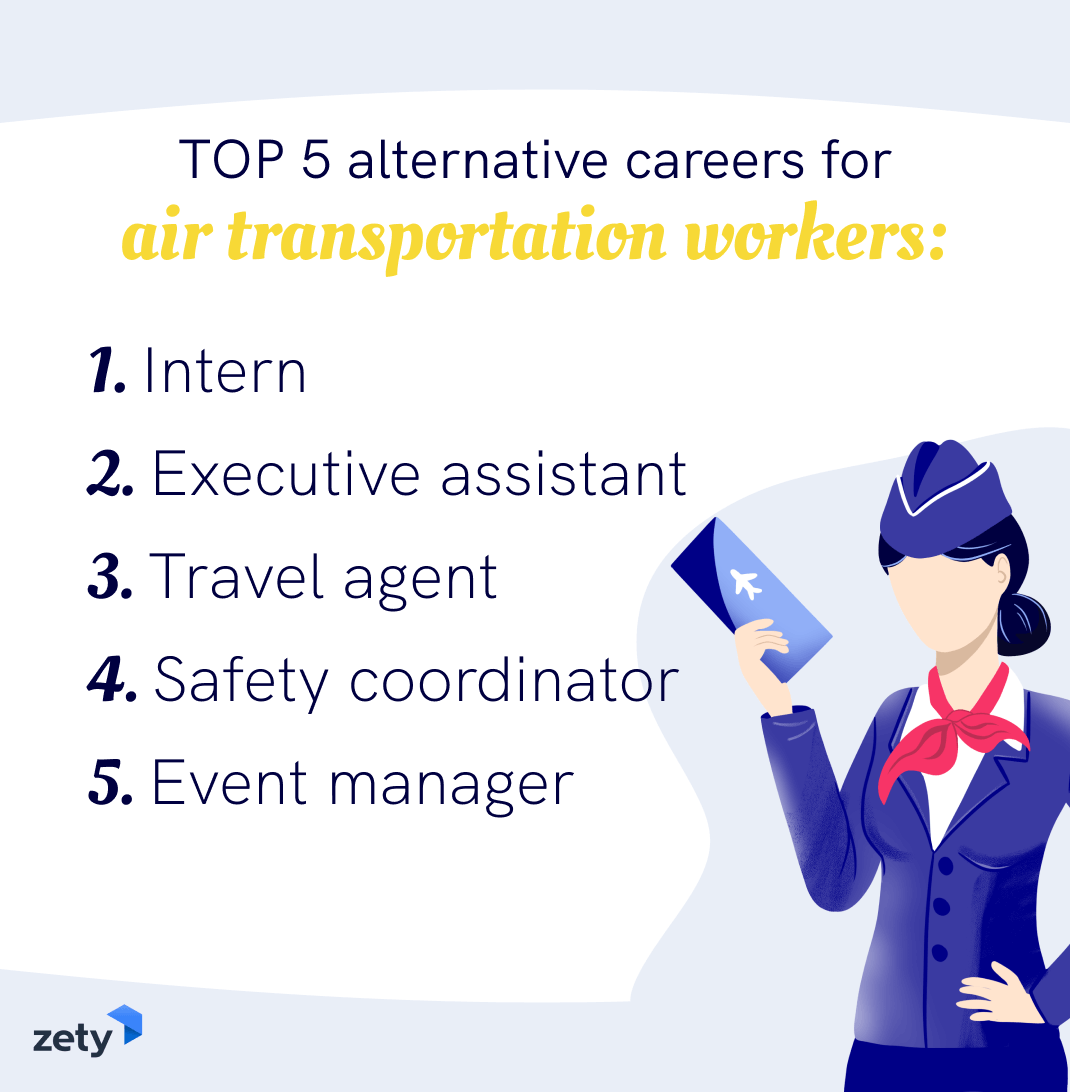
Top 5 alternative career paths
- Intern
- Executive assistant/personal assistant
- Travel agent
- Safety coordinator
- Event manager
As you can see, flight attendants who lost their jobs, can find employment in other positions related to travel and entertainment: as travel agents, safety coordinators, or event managers.
Those who wish to switch fields entirely might want to start a new career with an internship (the most common career transition choice for flight attendants), or become an executive/personal assistant.
Real estate and property management
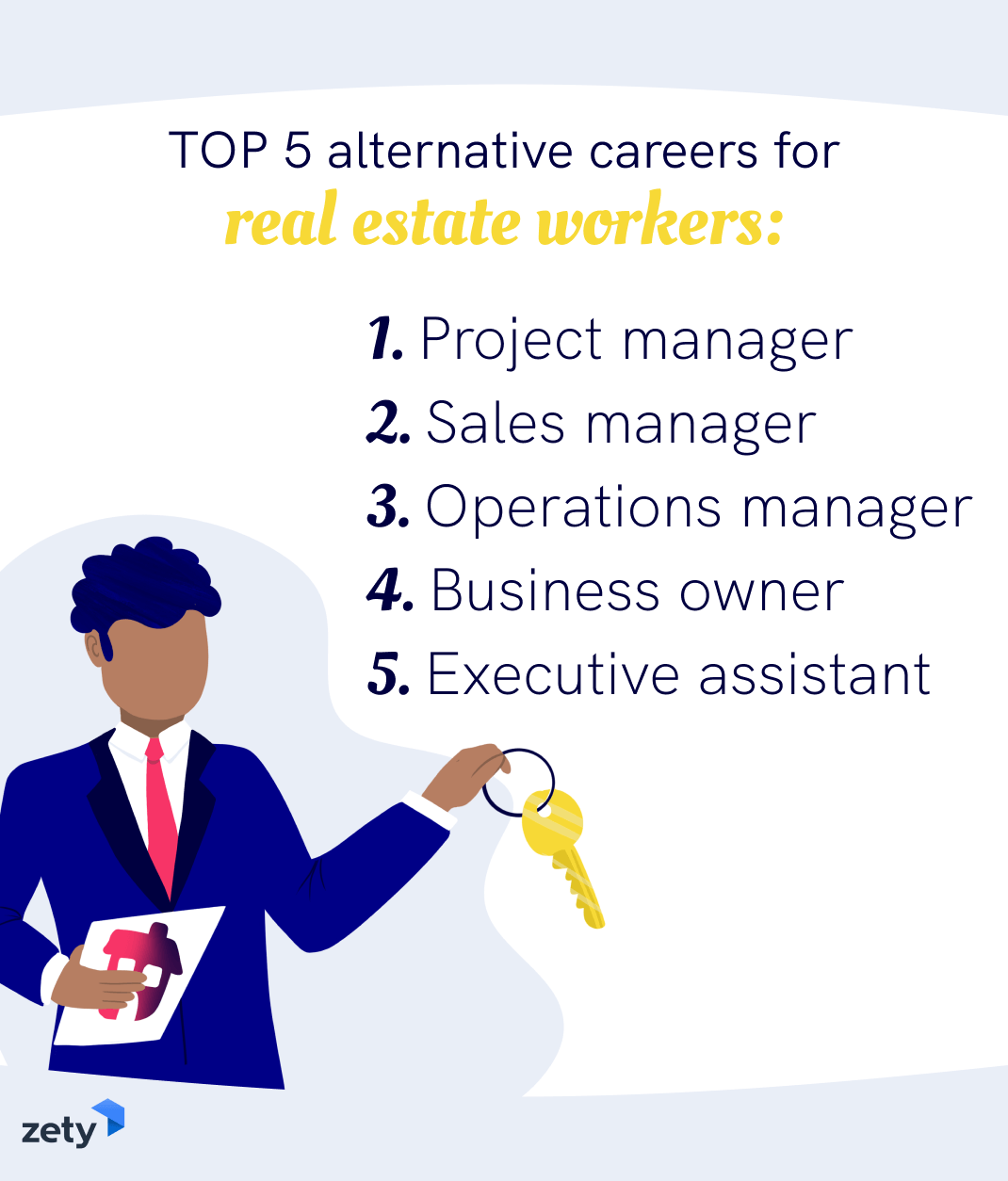
Top 5 alternative career paths
- Project manager
- Sales manager
- Operations manager
- Business owner
- Executive assistant
If you’ve lost your job in real estate and have trouble finding new employment in the industry that’s currently under severe stress, you can successfully apply for mid-level managerial roles—your skills in handling multiple projects at the same time, negotiating with tenants, licensing, and supervising maintenance will come in handy in project or operations management.
Or, you can make use of your professional network you’ve been curating and growing for years, and start your own business—even if jobs in real estate are scarce at the moment, your industry is anti-cyclical: soon, you’ll be able to generate dozens of your own leads and make a real income instead of a pay check.
Industries Least Affected by the Pandemic
Yes, the whole economy has slowed down dramatically. But—
There are a few sectors experiencing declines way below average. If you’re still not sold on any career transition ideas presented above, bear in mind that there are four additional types of jobs where positions are still widely available. We’ve looked into Indeed data on new job postings and here’s what we found.
The 4 key industries in which job postings haven’t declined as sharply as in other ones are:
- Logistic support
- Driving
- Construction
- Warehouse
Next, we wanted to see what kinds of professionals transitioned into one of the above listed careers.
Turns out, a lot of general labor workers were able to change careers and find employment in one of the fields currently untouched by the coronavirus pandemic. The most popular occupations for people who transitioned into one of the four fields listed above were:
- Cashier
- Administrative assistant
- Sales associate
- Machine operator
- Food server
- Line cook
That said, we’ve seen many instances of career changes from a specialist or a manager position into a general labor worker. Common professions that switched industries to work into general labor include project managers, engineers, sales reps, and IT specialists.
The takeaway here is clear: if you’re struggling for employment, as long as you’re somewhat physically fit and healthy, you probably have the skills necessary to find a general labor job to help you keep a steady income.
Methodology and Limitations
For this study, we extracted data from over 2,000,000 resumes created with our resume builder. To keep the data more relevant, we limited the analysis to downloaded resumes only (assuming those were actually used in the job search). Later, we further limited the sample to one document per user—leaving us with 133,289 resumes.
The data regarding the professions discussed comes from documents in which a user’s job title contains the job title discussed or a synonym of it (i.e. for a given resume to be included in the “retail” category, the job title on the resume had to contain one of phrases such as “retail,” “sales assistant,” “sales associate,” etc.). We came up with an extensive list of close synonyms for all of the positions analyzed, but might have missed a certain number of resumes due to some users’ spelling errors or highly specific job titles.
The data was collected anonymously. For non-discriminatory reasons, users’ age and gender was not disclosed in resumes. This limits a detailed demographic analysis.
Sources
- Employees on nonfarm payrolls by industry sector and selected industry detail | U.S. Bureau of Labor Statistics
- Employment by major occupational group | U.S. Bureau of Labor Statistics
- Michael Tomaszewski, Resume Statistics 2022 (Analysis of 133,000 Documents)
Fair Use Statement
Feel free to share our study! The graphics and content found here are available for non-commercial reuse. Just make sure to link back to this page to give the authors proper credit.
About Us
Zety helps evaluate resumes with a free resume checker. Jobseekers can use hundreds of cover letter examples to get inspired. Changing a career? Check our career change resume and a matching cover letter sample for a career transition.
About Zety’s Editorial Process
This article has been reviewed by our editorial team to make sure it follows Zety's editorial guidelines. We’re committed to sharing our expertise and giving you trustworthy career advice tailored to your needs. High-quality content is what brings over 40 million readers to our site every year. But we don't stop there. Our team conducts original research to understand the job market better, and we pride ourselves on being quoted by top universities and prime media outlets from around the world.


